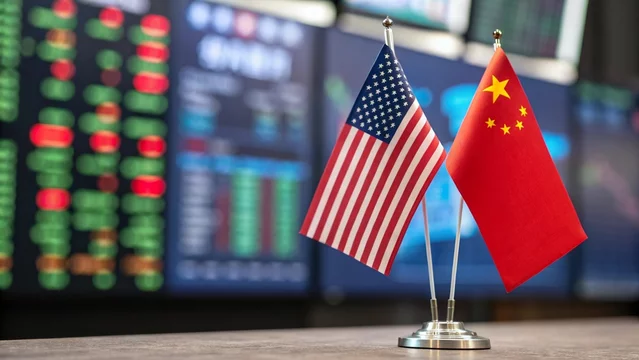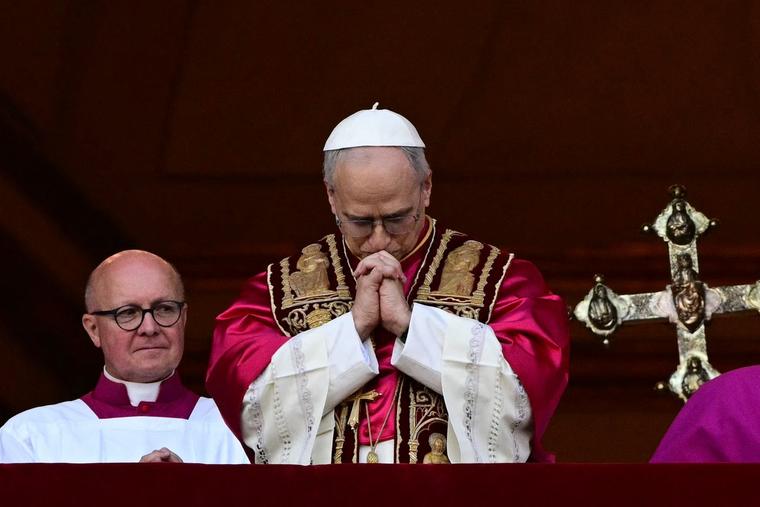U.S. and China Agree to 90-Day Tariff Truce, Markets Surge Amid Hopes for Lasting Deal
The U.S. and China agreed to a 90-day pause on tariffs, lowering rates significantly and boosting global markets while setting the stage for continued trade negotiations.
 USA and CHINA flag trade war symbolic relation
Less
by LogO
USA and CHINA flag trade war symbolic relation
Less
by LogOHONG KONG — The United States and China announced Monday a 90-day pause on most of the tariffs imposed on each other since last month, sparking a sharp rise in global markets amid hopes of easing trade tensions between the world’s two largest economies.
As part of the agreement, the combined U.S. tariff rate on Chinese imports will drop to 30% from a peak of 145%, while China’s levies on U.S. imports will fall to 10% from 125%, the two countries said in a joint statement. The announcement followed face-to-face negotiations over the weekend in Geneva — the first direct talks since President Donald Trump’s surprise “Liberation Day” announcement imposing 84% tariffs, which rapidly escalated.
The revised 30% U.S. tariff rate includes the 20% duty introduced early in Trump’s second term in response to alleged Chinese inaction on fentanyl, and a 10% universal tariff placed on all countries.
Markets responded strongly. The S\&P 500 surged 2.6%, the Dow Jones Industrial Average jumped over 1,000 points (2.5%), and the Nasdaq rose 3.5% in early Monday trading. European markets posted modest gains, while Hong Kong’s Hang Seng Index closed more than 3% higher. Chinese markets also closed higher before the deal details were made public.
Despite the optimism, analysts cautioned that the 90-day window provides only temporary relief. Goldman Sachs noted that tariffs remain significantly higher than pre-Trump levels, suggesting continued inflationary pressure on U.S. consumer goods. “The full set of U.S. tariffs would still be considerably higher and broader than expected by markets at the start of the year,” the firm said.
The agreement was described by both countries as a step forward. U.S. Trade Representative Jamieson Greer called the Geneva discussions “very constructive and positive,” noting that Chinese counterparts came to the table ready to negotiate. Treasury Secretary Scott Bessent echoed the sentiment, saying the talks averted what amounted to “the equivalent of an embargo.”
“We do want trade, we want more balanced trade, and I think that both sides are committed to achieving that,” Bessent said.
In response to questions about whether negotiations should have preceded the tariff hikes, Bessent defended the administration’s approach, saying past efforts to rebalance trade within the existing system had failed. “Business as usual would not have worked,” he said.
China’s Commerce Ministry called the deal “an important step” and urged the U.S. to end unilateral tariff practices. “It is hoped that the U.S. will build on the foundation of this meeting, continue to work in the same direction with China,” a spokesperson said.
The agreement also includes a mechanism for continued discussions. Greer and Bessent will remain the U.S. representatives, while China will be represented by Vice Premier He Lifeng. Talks may rotate between the U.S., China, or a mutually agreed third country, with working-level consultations expected on various trade and economic issues.
Bessent, speaking on CNBC, said another round of talks could happen in the coming weeks. “I would imagine that in the next few weeks, we will be meeting again to get rolling on a more fulsome agreement,” he said.
Other tariffs from Trump’s first term and recent ones tied to China’s role in global fentanyl trafficking remain in effect. Greer said those issues are being addressed in separate talks, which he described as being “on a very positive track.”
Bessent added that he believes China is now serious about curbing the flow of precursor drugs. He also rejected the notion of a full decoupling from China, clarifying that the U.S. seeks a “strategic decoupling” in key sectors such as steel, semiconductors, and medicine due to security concerns. “Efficient supply chains were not secure supply chains,” he said on MSNBC’s “Morning Joe.”
The impact of prior tariffs was already visible, with a sharp decline in shipping container traffic from China to the U.S. Danish shipping giant A.P. Moller-Maersk welcomed the truce, calling it “a step in the right direction” and expressing hope for a permanent deal to provide predictability for customers.
Tianchen Xu, an economist with the Economist Intelligence Unit, said the deal would bring significant relief to small and medium enterprises on both sides, especially struggling Chinese exporters. U.S. importers are also expected to benefit from the lowered tariff burden, which could ease inflation and support the labor market.
Wang Wen, dean of the Chongyang Institute for Financial Studies at Renmin University, called the agreement “a rekindling of global hope” but warned that complex issues remain unresolved, and the risk of renewed conflict still looms. “This situation is a major test of the political wisdom and negotiation capability of the decision-makers in both China and the U.S.,” he said.
Trump had signaled willingness to cut tariffs ahead of the Geneva talks. On Friday, he posted on Truth Social, “80% Tariff on China seems right! Up to Scott B.” In response to another question about tariff cuts, Trump said, “It could be… You can’t get any higher. It’s at 145, so we know it’s coming down.”
“I think we’re going to have a very good relationship,” he added.







Conversation